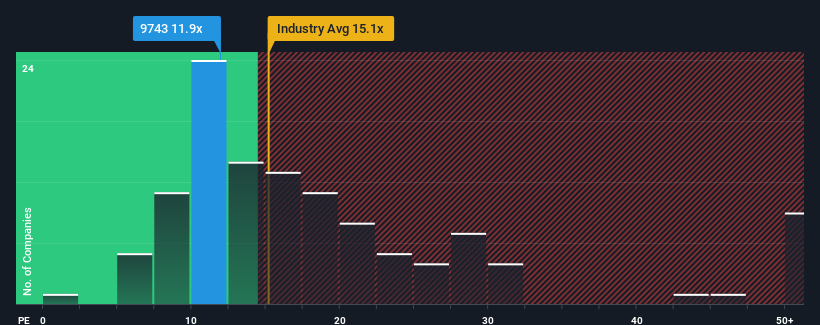- Japan
- /
- Professional Services
- /
- TSE:9743
What Tanseisha Co., Ltd.'s (TSE:9743) 26% Share Price Gain Is Not Telling You

Tanseisha Co., Ltd. (TSE:9743) shareholders would be excited to see that the share price has had a great month, posting a 26% gain and recovering from prior weakness. Taking a wider view, although not as strong as the last month, the full year gain of 21% is also fairly reasonable.
In spite of the firm bounce in price, you could still be forgiven for feeling indifferent about Tanseisha's P/E ratio of 11.9x, since the median price-to-earnings (or "P/E") ratio in Japan is also close to 14x. Although, it's not wise to simply ignore the P/E without explanation as investors may be disregarding a distinct opportunity or a costly mistake.
Tanseisha certainly has been doing a good job lately as it's been growing earnings more than most other companies. One possibility is that the P/E is moderate because investors think this strong earnings performance might be about to tail off. If not, then existing shareholders have reason to be feeling optimistic about the future direction of the share price.
See our latest analysis for Tanseisha

What Are Growth Metrics Telling Us About The P/E?
The only time you'd be comfortable seeing a P/E like Tanseisha's is when the company's growth is tracking the market closely.
Retrospectively, the last year delivered an exceptional 158% gain to the company's bottom line. Pleasingly, EPS has also lifted 321% in aggregate from three years ago, thanks to the last 12 months of growth. So we can start by confirming that the company has done a great job of growing earnings over that time.
Turning to the outlook, the next year should bring diminished returns, with earnings decreasing 1.0% as estimated by the dual analysts watching the company. Meanwhile, the broader market is forecast to expand by 12%, which paints a poor picture.
With this information, we find it concerning that Tanseisha is trading at a fairly similar P/E to the market. It seems most investors are hoping for a turnaround in the company's business prospects, but the analyst cohort is not so confident this will happen. There's a good chance these shareholders are setting themselves up for future disappointment if the P/E falls to levels more in line with the negative growth outlook.
The Key Takeaway
Its shares have lifted substantially and now Tanseisha's P/E is also back up to the market median. Typically, we'd caution against reading too much into price-to-earnings ratios when settling on investment decisions, though it can reveal plenty about what other market participants think about the company.
We've established that Tanseisha currently trades on a higher than expected P/E for a company whose earnings are forecast to decline. When we see a poor outlook with earnings heading backwards, we suspect share price is at risk of declining, sending the moderate P/E lower. This places shareholders' investments at risk and potential investors in danger of paying an unnecessary premium.
Don't forget that there may be other risks. For instance, we've identified 2 warning signs for Tanseisha (1 is a bit concerning) you should be aware of.
Of course, you might find a fantastic investment by looking at a few good candidates. So take a peek at this free list of companies with a strong growth track record, trading on a low P/E.
Valuation is complex, but we're here to simplify it.
Discover if Tanseisha might be undervalued or overvalued with our detailed analysis, featuring fair value estimates, potential risks, dividends, insider trades, and its financial condition.
Access Free AnalysisHave feedback on this article? Concerned about the content? Get in touch with us directly. Alternatively, email editorial-team (at) simplywallst.com.
This article by Simply Wall St is general in nature. We provide commentary based on historical data and analyst forecasts only using an unbiased methodology and our articles are not intended to be financial advice. It does not constitute a recommendation to buy or sell any stock, and does not take account of your objectives, or your financial situation. We aim to bring you long-term focused analysis driven by fundamental data. Note that our analysis may not factor in the latest price-sensitive company announcements or qualitative material. Simply Wall St has no position in any stocks mentioned.
About TSE:9743
Tanseisha
Engages in the research, planning, design, layout, production, construction, and operation of commercial, public, hospitality, event, and business and cultural spaces in Japan and internationally.
Excellent balance sheet average dividend payer.
Market Insights
Community Narratives



